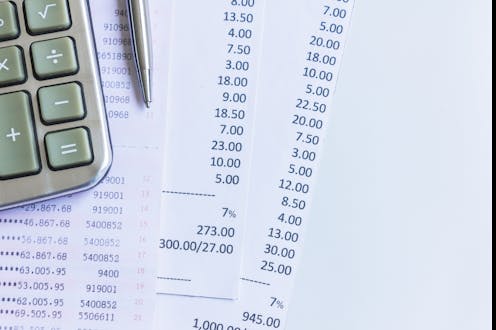Over 300,000 New Zealanders owe more than they own – is this a problem?
- Written by Max Rashbrooke, Research Associate, Institute for Governance and Policy Studies, Te Herenga Waka — Victoria University of Wellington

New Zealanders, like many of their developed country counterparts, have built up significant debts[1] in recent decades. There are differing views, however, on whether this constitutes a problem.
For some, indebtedness indicates a precarious situation – often described as being “underwater” – in which a person is unable to match their expenses to their income. For others, it represents investment: a temporary borrowing in order to be able to earn more in future.
To investigate this, we used data from the net worth module attached to the Household Economic Survey[2] in 2014–15 and 2017–18. This provides information about individuals in “negative net wealth” – that is, those whose liabilities (debts) exceed their assets (wealth).
What is clear is that the number of New Zealanders with negative net wealth is both large and growing. In 2014–15, there were 314,000 indebted New Zealanders out of an adult (15+) population of 3.55 million, or 8.8%.
Just three years later, that number had increased to 363,000 out of 3.81 million, or 9.5%, despite the absence of a major economic shock – along the lines of the global financial crisis – in that time.
Where the debt sits
To establish whether this constituted a serious policy problem, however, we had to look more closely at these individuals’ characteristics.
Most of them have low incomes: 32% report incomes under NZ$13,240, and 68% under $36,596 (the median individual income at that time). Just 4% are in the highest tenth of income earners. Clearly, most of those in negative net wealth are not lavish-spending high-rollers.
Read more: NZ's unemployment insurance scheme will be the biggest welfare shakeup in generations – is it justified?[3]
This might ring alarm bells: having a low income suggests an inability to repay debts. But that depends on a couple of further characteristics, including age and the nature of the liability.
Those in negative net wealth are disproportionately young: 58% are under 29, and a further 25% are aged 30 to 44. Just 3% or so are over 65.
Nearly two-thirds of the debts are in mortgages, whether for owner-occupied homes or investment properties (51.3% and 13.7%, respectively). This is followed by student loans (21.9%), “other” debts (11.7%), credit cards (1%) and hire purchase (0.4%).
Are debts backed by assets?
Combining the above two forms of analysis, we found that for people in negative net wealth aged 15 to 24, nearly three-quarters of their debts (73.4%) are in student loans, whereas for people aged 55 to 64, 80.6% are in mortgages on their own homes.
This suggests the problems of indebtedness may not be as great as they appear. The major forms of debt – mortgages and student loans – are both backed, at least in theory, by assets: housing, in the case of mortgages, and “human capital[4]” (marketable skills and education) in the case of student loans.
This indicates that many of those in negative net wealth have the ability to repay their debts or, at the very least, are accumulating some kind of asset.
Read more: NZ's government plans to switch to a circular economy to cut waste and emissions, but it's going around in the wrong circles[5]
But there are still several reasons to be concerned. Firstly, the assets mentioned above may not be entirely solid. Although house prices generally rise, and have recently been soaring, they have also been known to fall (in New Zealand as elsewhere). And the long-expected correction in the housing market may finally be about to happen, if bank predictions[6] are to be believed.
Human capital is also somewhat notional: while graduates do on average earn two-thirds more[7] than those with no tertiary qualification, not all degrees lead to high incomes, especially in a labour market characterised by high levels of precarious, insecure and casual work[8].
Many young people will be burdened by both large student loan debts and significant mortgages (assuming home ownership is attainable at all).
Debt and poverty
It is also not difficult to imagine negative net wealth becoming a problem for, say, a mid-level office worker who suddenly loses their job at the same time that their home – which they borrowed heavily to buy – falls sharply in value.
One of the principal concerns about debt, after all, is that it often represents a vulnerability – in other words, a probable lack of resilience in the face of major economic shocks.
Secondly, even if the forms of debt more generally considered problematic – such as those incurred on credit cards and via hire purchase – are relatively marginal, they are also most likely to affect those in the most difficult financial situations.
Read more: COVID-19 is predicted to make child poverty worse. Should NZ's next government make temporary safety nets permanent?[9]
Charities and NGOs have repeatedly warned[10] about the problems faced by families forced to turn to payday lenders and finance companies charging high interest rates. Research has also highlighted debt[11] as one of the central factors keeping families in poverty.
Thirdly, the burden of negative net wealth is not evenly distributed. Of the 363,000 individuals in that situation, 195,000 are women, against 168,000 men. Just 8.1% of people of European descent are indebted, compared to 11.5% of Asian New Zealanders, 13.3% of Māori and 14.5% of Pasifika.
Read more: NZ's second 'Well-being Budget' must deliver for the families that sacrificed most during the pandemic[12]
The wealth gap
These inequalities then overlap, such that the proportion of Pākehā men in negative net wealth (7.5%) is less than half that for Pasifika women (17.5%). This reflects – and exacerbates – other economic disparities, such as ethnic and gender pay gaps[13].







